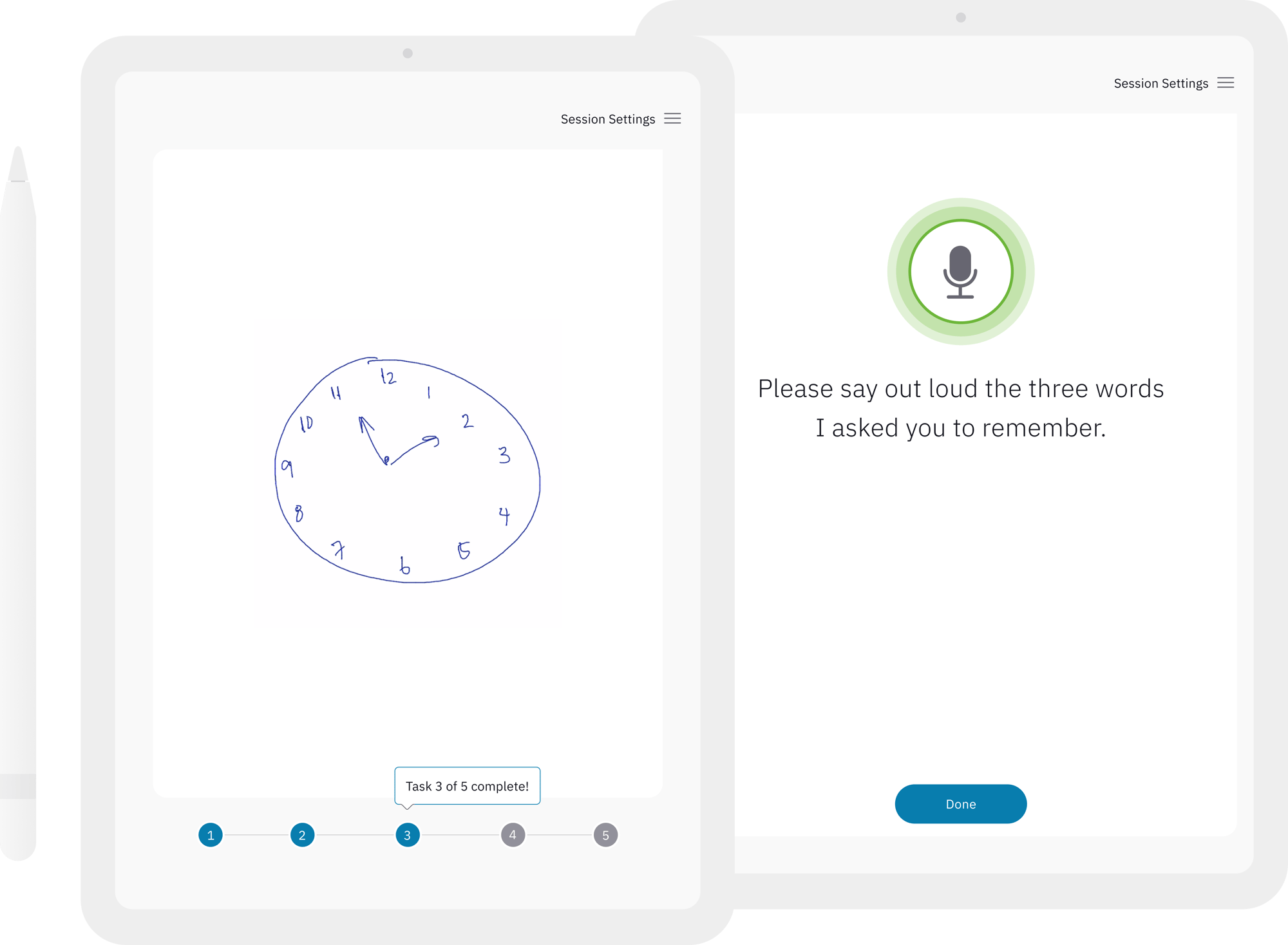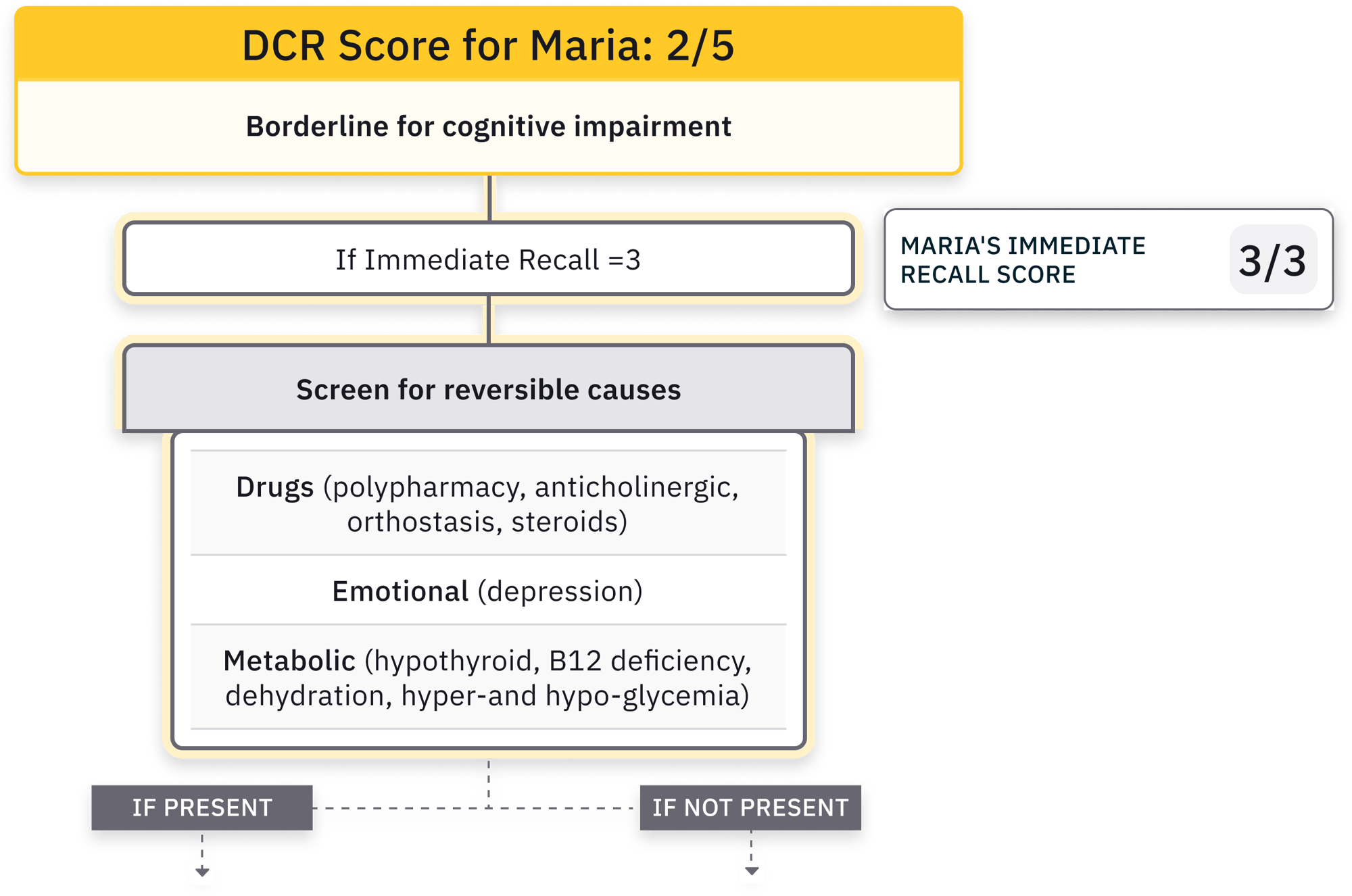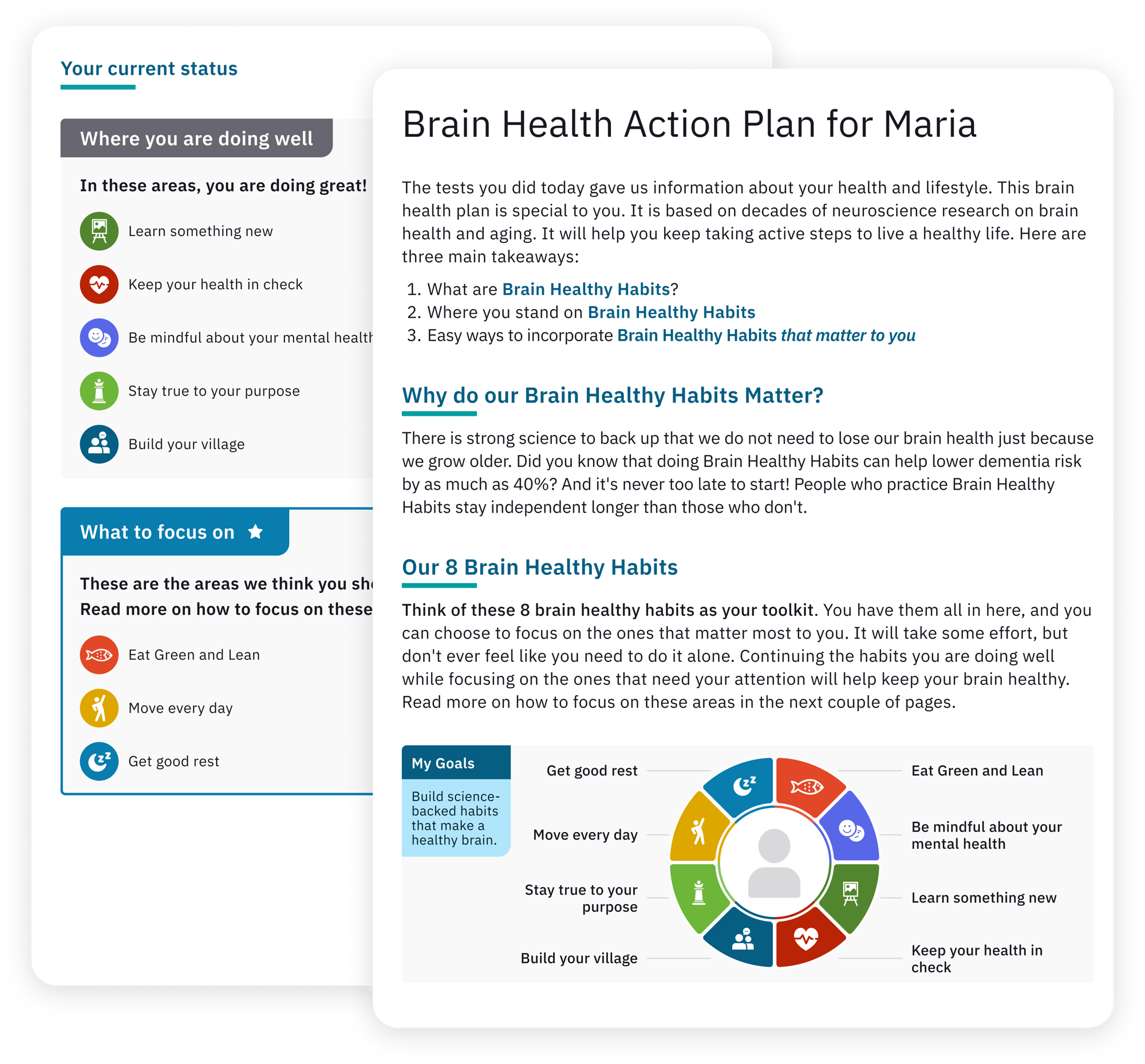Enable a new approach to brain health
Next-generation digital cognitive assessments help providers detect early signs of cognitive impairment — efficiently.

Equipping providers for an evolving landscape
The global approach to Alzheimer’s and other dementias is changing. The science of lifestyle interventions continues to expand and emerging treatments show promise for slowing disease. For patients to reap the most benefit from any of these interventions, time is of the essence. However, up until now, providers have lacked the practical tools needed to adopt cognitive assessments as part of the standard of care. Our AI-enhanced digital cognitive assessment platform is changing that, helping providers assess for and address cognitive impairment in a whole new way.
Watch this novel brain health assessment platform in action
Discover the benefits of practical, insightful, and actionable cognitive assessments.
A trusted partner for leading physician practices
We proudly serve healthcare providers with seamless integration and ongoing support to enhance clinical workflows and patient engagement.
Helping bring cognitive assessment into the standard of care
-
Meet rising cognitive care needs of older adults
Scientifically-validated, sensitive, digital technology supports early detection of cognitive impairment, while actionable clinical guidance and personalized patient action plans inform next steps.
-
Streamline testing for early signs of potential dementia
Linus Health's iPad-based platform speeds up and simplifies the cognitive testing process from start to finish – replacing manual administration and cumbersome workflows with time-saving automation.
-
Boostthe bottom line
Expanding cognitive assessments unlocks new avenues for reimbursement, while digital administration by MAs and other clinical staff frees up provider time for other clinical activities.
-
“Linus is easy to use for both staff and patients. Navigating the app and online portal is very easy and comfortable to work with.”
Provider Physician Practice in Maryland -
“The iPad and Apple Pencil are super nice. Everything is explained well. I could hear the assessment audio well, and it will be good for patients who have a hard time hearing.”
Clinical Administrator Physician Practice in Georgia -
“We have dealt with multiple companies over the years, and Linus was one of the best that we have dealt with. Everyone had answers and were so helpful setting everything up.”
CEO & Owner Physician Practice, Southeast Region
Digital tools, purpose-built for primary care
Coupling human clinical expertise with AI, the Linus Health Platform brings visibility to early signs of cognitive impairment. A cornerstone, the Core Cognitive Evaluation™ combines objective analysis of cognitive function — from the Digital Clock and Recall (DCR™) — with findings from the Life and Health Questionnaire (LHQ) for multifaceted brain health insights.
DCR™
Our DCR software detects subtle signs of cognitive impairment by analyzing a person's performance on a combination of clock drawing and word recall tasks. Powered by the award-winning DCTclock™ — a scientifically-validated test that uniquely derives insights about cognitive function from both the clock outputs and drawing process itself — DCR picks up signs of impairment invisible to the human eye. Automated and easy to administer, it typically takes just three minutes to complete.

Actionable insights for providers
Empowering providers with more than just a score, the platform delivers robust clinical insights to inform care pathways. Immediate online access to rich, intuitive reports provides visibility into patient performance in a range of cognitive domains. Detailed results, coupled with evidence-based clinical decision support from our multidisciplinary medical team, give providers a new level of insight and guidance.

Personalized action plans for patients
Providers can choose to enhance their cognitive assessment with the LHQ, a digital patient survey that helps uncover patients' modifiable risk factors for dementia. Using these responses, the platform dynamically assembles patient-friendly action plans, giving providers a functional framework for counseling on lifestyle-based interventions. From enhancing sleep quality to building community, plans offer evidence-based recommendations to promote brain health in daily life.

Self-guided product tour
Curious how Linus Health fits into your clinical workflow? Take a closer look at the platform in action to learn what using Linus is like for both providers and patients.
Frequently asked questions about cognitive impairment tests
Below you'll find answers to the most common questions about cognitive assessments.
How do primary care providers test for cognitive impairment and dementia?
There are several different ways a provider can assess a patient’s cognition. Historically, paper and pencil assessment tools, such as the Mini Mental Status Exam (MMSE) and the Montreal Cognitive Assessment (MoCA), have been most common. However, recent digital innovation has ushered in significant advancements in cognitive testing. Digital cognitive assessments, like Linus Health’s Digital Clock and Recall (DCR), leverage familiar digital devices to streamline test administration and offer robust clinical insights to providers.
What does a cognitive assessment show?
The purpose of a cognitive assessment is to evaluate cognitive function and identify potential signs of cognitive impairment. The scope of cognitive domains tested (e.g. attention, executive, visuospatial) varies on the assessment used. At Linus Health, our digital cognitive assessments incorporate AI to derive cognitive function insights from a person’s process of completing cognitive tests (e.g., drawing a clock), not just the final product (the clock), for a deeper understanding of cognitive function. This process-based analysis in neuropsychological testing is known as the Boston Process Approach and unique to Linus Health.
Why would a physician perform a cognitive screening or assessment?
Cognitive assessments provide valuable clinical information about a patients’ cognitive function in a variety of scenarios. Whether to perform routine cognitive screening; to investigate a cognitive complaint (e.g. memory concerns, mood changes; or as part of care planning for individuals with known cognitive disorders, cognitive testing offers benefits for many older adults. In general, the earlier providers can identify cognitive impairment, the sooner they can take action to help patients gain access to specialists and treatment (as needed and where appropriate), as well as adopt lifestyle interventions to promote brain health. Read our white paper on addressing modifiable risk factors.
How do cognitive health solutions help providers enhance cognitive care?
In addition to the benefits digital cognitive tests themselves offer (e.g. streamlined workflows, objectivity, sensitivity), a broader digital brain health assessment platform can deliver a range of additional benefits to providers. For example, the Linus Health digital platform also includes integrated clinical guidance to support providers with next steps based on cognitive assessment results. It also generates brain health action plans to help patients take lifestyle and health-based steps to promote brain health.
Prepare for shifting dynamics in cognitive care
Download the guide below for insights on preparing for older adults' evolving brain health needs.



